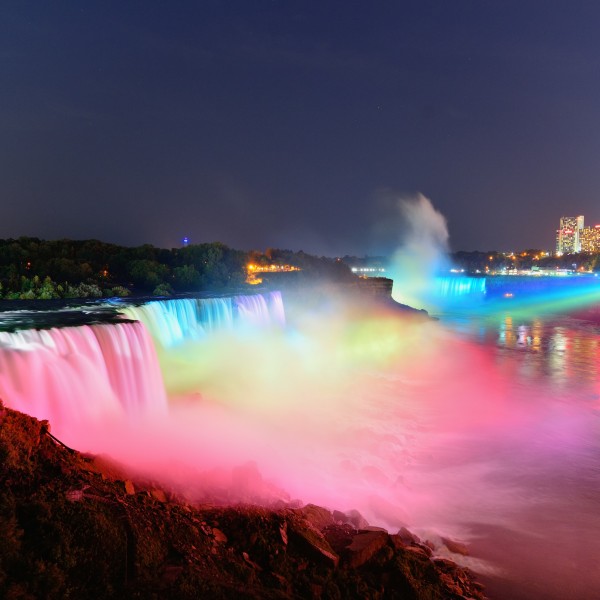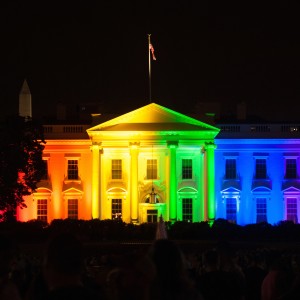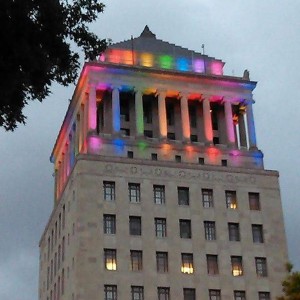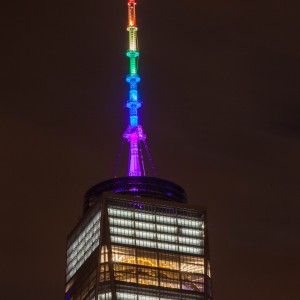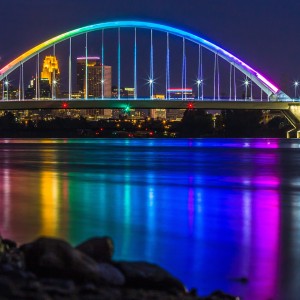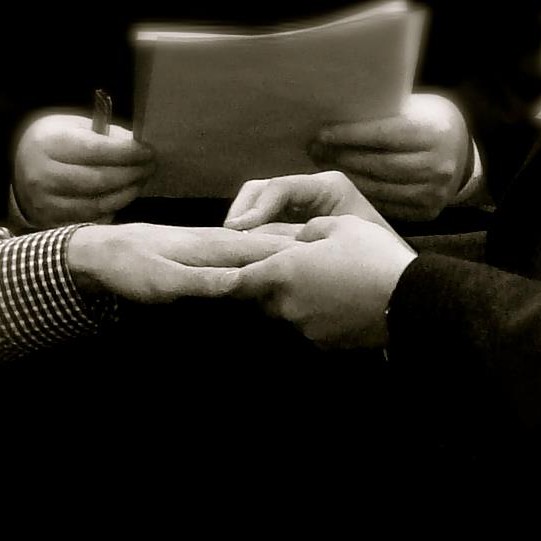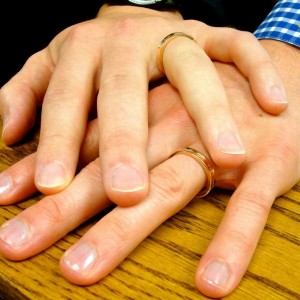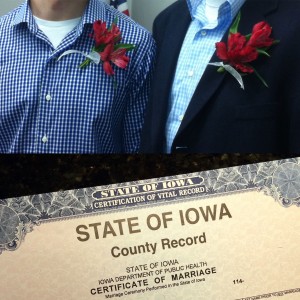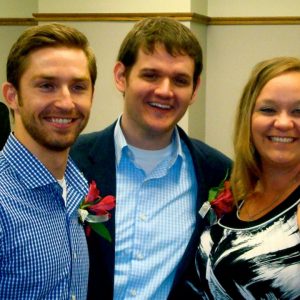Marriage Equality Declared a Fundamental, Constitutional Right: My Personal Reaction to Obergefell v. Hodges
It’s been almost a week since the Supreme Court handed down its decision in Obergefell v. Hodges declaring marriage equality a fundamental right under both the Due Process and Equal Protection clauses of the 14th Amendment to the United States Constitution. I’ve had some time to reflect on my thoughts and feelings, both in the personal sense, given how much this affects Aaron and me, and in the broader, intellectual and political sense.
Before we get into the latter, which I’d like to reserve for another post, I think it’s only fair to provide some insight into my personal history; context to help you understand what makes me who I am and the experiences that shaped me; context that, I hope, will let you get a clearer picture of why this matters so much and my own bias, which limits the degree to which I can be objective about it.
A Lesson from My Parents: Marriage Matters
One of the greatest gifts I was given in life is a set of parents who love each other deeply and unconditionally. Within a few months of meeting, they were engaged; the question popped in an orange pickup truck outside of a movie theater as if it were the most natural thing in the world, no ring in sight. The first time my mom walked into the sporting goods store my dad ran, he turned to the person next to him and said, “That’s the girl I’m going to marry.” When my mom brought my dad home to meet her mother, even my grandma said she knew in that moment, “He’s the one for her.”
When they walked down the aisle and said, “I do”, my dad was 22 and my mom 19.
Almost a year after the vows were taken, I was born. Two years thereafter, a set of twins arrived, my brother, Caleb, and sister, Kelsey; the following decade, my youngest sister, Harley.
The great American composer and lyricist Stephen Sondheim wrote in one of his more famous works, “Be careful the things you say, children will listen. Be careful the things you do, children will see.” In the case of my siblings and myself, as it pertained to finding our proverbial other half, being born into the family we were was like winning the lottery. From my earliest memories, mom and dad armed us with tools and strategies that would pay dividends for a lifetime, passing on wisdom that, somehow, they had come to possess.
Reading with us, driving to piano lessons, volunteering to run sports teams … in all of those countless, small, intimate moments that build a relationship, they transferred knowledge to each of us about how to find our husband or wife and establish a marriage. “Never date someone you wouldn’t want to marry. Dating is an interview process to find the person with whom you want to build a life. If a person isn’t right, but you open yourself to developing feelings, it’s too late. Don’t stack the deck against yourself.” “Never embarrass your husband or wife in public. If you disagree, tell them in private so they know that no matter what, regardless of the circumstance, you have their back.” “When you get married, you have to put your spouse above us. They have to become your primary loyalty.” “When you commit to someone, even if you ever fall out of love, for the sake of respect for the love you once had, give them the courtesy of a divorce before you begin a relationship with someone else. Let them know that no matter how bad things are, or what the temptation, as long as you’re married, he or she will never have to worry about you opening your heart to someone else. Give them that security.” “Don’t go to bed angry.” “When you sleep with someone, you give away a part of your heart. You create a memory, and an intimacy, that will always exist; that you can’t take back and that should, if possible, belong solely to your spouse. Be careful before you hand out something that valuable because you are valuable. You deserve to be loved not just for your body, but your entire self. Making love is an extension of that; a gift, not just an act. Never be pressured into anything. Listen to your heart.” “Don’t allow your children or a situation to divide you. If you have a disagreement about something, work it out together and be united. You’re a team.” “Be the type of person that you, yourself, would want to date. You have as give as much to a relationship as you take from it.” “Never be afraid to express your feelings. Be vulnerable. Tell the people you love that you love them everyday.”
They weren’t just words, we saw them live these values, witnessing first hand how they bore fruit. Intentionally or unintentionally, mom and dad handed us a skill set that was every bit as priceless as it was rare; an education for which my siblings and I paid no tuition. They taught us that the foundation of a great marriage is love, but that love alone isn’t enough. You have to choose, every day, and with every action, to honor the covenant you made; to build each other up; to hold each other accountable; to allow the other person to be completely, and unapologetically, themselves; to stand alongside them, hand in hand, no matter the challenges or obstacles, in sickness and health, for richer or poorer, for better or worse.
With religion playing such a fundamental role in our lives, the importance of marriage was reiterated at night, when dad would come into our bedrooms to read the Bible to us. As he prayed with and over my siblings and me, he would ask God to protect our future husbands and wives. Years later, it was communicated to us when, driving away from family visitation at basic training after seeing my brother at military boot camp, my mom broke down in tears about leaving him behind, alone. “I just want him to have somebody. My baby is out there by himself.” There was no doubt that they loved us, that we were worthy of love, and that, someday, we’d find someone with whom we wanted to spend the rest of our lives, too.
Dealing with an Unexpected Curveball
When I was 10 or 11 years old, my world changed in a way that I never could have anticipated; something that wasn’t even on my radar of possibilities as we had no exposure to it or examples of it given the insular, religious environment in which we were raised, our daily experience confined to a town of no more than 3,500 people at a time when the Internet barely existed. Unlike everyone else around me – my friends, family, community members – I woke up to find that not only had I not developed the emotional and physical interest in girls that had been promised by every Bible story, fairy tale, Disney movie, book, and couple I saw, but worse, every fibre of my being had begun reacting like electricity around the attractive older boys. The way their hair fell across their forehead. Their smiles. How their legs looked when they ran. Heart fluttering. Breath quickening. Eyes averted. Panic.
This was not the deal I had been promised. I somehow knew, instinctively, that I could never mention it. No one could ever find out if I wanted to survive. I did everything I could to ignore the feelings; to push them away. “It’s just a phase. It has to be. Everybody said you start liking girls so it will happen. I just have to try harder.” And so try I did. Every day, without exception.
When I entered middle school in 6th grade, we lived fairly close so my parents would let me walk some mornings as my dad dropped my younger siblings off at the elementary school across town on his way to work, my mom at home, pregnant with my youngest sister. My memories of that time in my life are cold, crisp, winter mornings when I could see my breath in front of me; the sun coming up, frost on the ground. Each step, 11 and 12 years old, pleading with God to fix whatever was wrong with me; bargaining, begging for this be the day when it happened; asking for forgiveness for being so deficient that I caused whatever this was.
That same year, a teacher responding to a question from another student remarked that some boys liked other boys; that they were called gay, or the more common term in those days, “homosexual”. I froze, scared to move in case it drew attention to me. The idea there could be others experiencing what I was going through seemed impossible. Where were they all? Why had I never seen or heard about any of them? I kept repeating it over and over in my head, fearful to write it down in case someone found evidence of my brokenness.
When I gathered the courage to try and learn more using the only tools I had at my disposal – the public library and bookstores – it made things worse because I found the world I briefly described. Nearly every resource on the topic shared the sentiments of New York Times bestselling author Tim LaHaye, who wrote in one of his books, “Many … parents would prefer the death of their child to his adopting the unhappy wretchedness of homosexuality”. “God would never have commanded the death penalty for homosexuality if a person was really “born that way.” All capital punishment was for crimes a person committed voluntarily. Homosexuality is no exception (Leviticus 20).” “No doubt some homosexuals are indeed demon possessed.” “Even after a demon is cast out, if indeed that is necessary, the individual still has to overcome the homosexuality that caused him to become so rebellious toward God that he made himself vulnerable to the demons in the first place.”
And out of nowhere, President Bill Clinton happened. He tried to change the law so gay people could serve in the military without being fired. Suddenly, the sleepy, insular world around me, which had been completely devoid of any reference to the hint of possibility there were others like me, talked about nothing else. The culture wars had arrived full force. I heard men and women with whom I had grown up – good people I’d never known to utter an unkind word about anyone – assert, with completely sincerity, that being gay caused AIDs, not a virus; that it spontaneously formed as a righteous judgment from God to kill “them” off for their perversion not realizing the little boy listening to every word they said was dealing with this. (You can imagine the kind of destruction that does to a kid’s mind.) Certain music was banned because there was a fear that “demons of homosexuality” could infect us through it. The stereotypes and lies that were repeated seem ridiculous today but everyone just accepted them; lies like gays were wildly promiscuous and had hundreds of sexual partners a night; that their relationships were inherently unstable; that they were prone to violence; that they were created as a result of being raped by pedophiles and/or having an absent father (that last one confused me since neither was applicable in my case – my dad loved us so much he made a point to tell us at least once a day and I certainly wasn’t abused by anyone – but it came from no less an authority than hugely influential child psychologist Dr. James Dobson, who had served in advisory capacities to both the White House and the Attorney General; who had sold millions upon millions of books; who had a nationally syndicated radio program and was held up as an authority in nearly every evangelical circle in the country).
Time passed. I stuck to the script, hoping each morning that it would be the day I’d wake up to find girls – any girl, in any capacity, no matter how tiny, just once, even if for a moment so I knew change was possible – attractive; that seeing certain guys wouldn’t cause my chest to tighten or my throat to catch. That, I could find my mind wandering when I thought about them rather than their boyfriends whom I found far more interesting.
The trouble? Deep down, I’m a hopeless romantic. You probably would be, too, if you grew up like I did, seeing your parents unapologetically in love, witnessing every day how two people really can become more than either of them are individually. To compensate, I began to put walls around my heart to protect myself. The more open I was, the greater the danger people would find out my secret; to see how there was this evil inside of me that would make them stop loving me. It was constant fear of discovery. The cost, even in the small things, was incalculable. Moments and memories were stolen in ways I can never have restored; things others take for granted as rites of passage. I distanced myself from everyone, even my little brother, shutting down any conversation about the girls he liked for worry the topic would turn back on me. I couldn’t share my first crush; ask someone to a dance; be open about the anxieties that come with being a teenager. It felt like being on the ocean, in a wooden rowboat, during a storm. Hunker down, hang on as tightly as you can, and pray for survival.
The Night I Broke
Most of the time, I did reasonably well, all things considered. Only once did I break; a couple of years later when I thought about the possibility of marrying a boy for the first time. My parents had decided the six of us needed one of our regular family movie marathons. One of the films we saw was a typical romantic drama called Bed of Roses. The story was about a widower in New York City; a florist who loved his wife so deeply that when she died, he withdrew from his friends and family. He was unable to sleep at night so he’d walk the streets, trying to find peace. During one of these evening escapes, he spotted a woman in her window and was instantly drawn to her. She turns out to be an investment banker who has put her career ahead of everything; who has no time for love. He pursues her, she decides love is more important than money, and they live happily ever after. It wasn’t some great piece of cinema but in that moment, it cut right through the 13 year old kid who had been trying to hold it together.
Later that evening, after everyone had fallen asleep, I lay in the dark in the small bedroom I shared with my brother. All of the walls I had put up, all of the reinforcements I had built around my heart, cracked. Like water flooding over a dam finally giving way, I shattered. Grief like nothing I’ve felt in my life, before or since, escaped as I buried my head in my pillow. I sobbed uncontrollably, unable to breathe, stifling the sound in the sheets so no one would hear me. I wanted to love someone like that. I didn’t understand why I couldn’t; why something everybody else got to celebrate had to be hidden. I didn’t understand why all of the other stupid rules we ignored, like stoning women and kicking children born out of wedlock out of society, were discarded but I couldn’t find a boy with whom I wanted to grow old and build a life. I didn’t understand why I felt the way I did or what I had done to deserve it. I didn’t understand why it was wrong in the first place since nobody was harmed (it wasn’t like alcoholism or adultery) or how people ignorantly believed it was a choice. I didn’t understand how I was going to someday pull up to a house, sit in the driveway, and gather the strength to walk into greet a woman I didn’t want to see because everyone expected me to get married. I thought about having to stand in front of my friends and family and say to some girl, “I do”, but wishing she were someone else, dreading the words coming out of my mouth. And for a brief moment, I thought about something I had never even considered: I allowed myself to picture what it would be like to stand across from not a bride, but a groom, and be treated exactly like my parents, my siblings, and the people in the community.
In the majority opinion, Justice Kennedy writes: “Marriage responds to the universal fear that a lonely person might call out only to find no one there. It offers the hope of companionship and understanding and assurance that while both still live there will be someone to care for the other.” Those words are my lived experience. Those words reflect what that 13 year old kid was feeling in a moment of complete despair when a pain and longing caused by a culture that lied to him reached a breaking point; a culture that told him the very best parts of who he was, the things to which he aspired in life and that made him human, were intrinsically disordered based on nothing but the same irrational, illegitimate, and wholly unfounded prejudice and bigotry it had wielded towards other groups in the past.
It Gets Better … It Really Does
Love is a funny thing though. It doesn’t much care about public opinion. It shows up in the most unexpected of places at the most unexpected of times. It cuts through where the strongest weapons can’t and overcomes obstacles that would otherwise seem insurmountable.
It wasn’t many years after that night that I met Aaron. Like most people who are blessed to have encountered their husband or wife early, he is the great dividing line by which everything else is referenced. He healed me in ways you cannot imagine, and thawed the part of me that had grown cold to the world by wearing me down with this unrelenting, selfless kindness.
From the time we were teenagers until today, we have fallen asleep next to each other, thousands upon thousands of evenings making one another laugh, talking about our day, planning for the future. He has been at my side for practically every major life milestone. He is the person I want to call when I have good news and the person I want to wrap in my arms when something goes wrong. His opinion is the only one that counts. The entire world could hate me and as long as he still looked at me the way he has since we were kids, I could deal with it. He makes me braver than I am because I know no matter how badly I fail, he will never love me any less. If we lost everything tomorrow and needed to go work in coal mines to survive, he’d put on a hat, grab my hand, and never complain.
Being married to Aaron has given my life a meaning that I felt I had no right to expect. I see how incredible he is with our nieces and nephews and can’t wait to be a dad with him. This is the man with whom I want to watch our sons and daughters grow older; to take them to Disney World, dance recitals, baseball games, and school plays; to console them when their heart is broken for the first time. He’s the one I want to be sitting next to on the porch when our grandkids are running around the yard.
What the Obergefell decision does is guarantee our ability to do that as full and equal citizens of the United States. It declares, as the highest law of the land, that it is a matter of basic liberty we, and not the government, have the power to decide how to live our lives and with whom we want to share it. It acknowledges and confirms what the dozens of lower courts found during exhaustive trials in which the best experts on both sides were called: That there is no rational justification for excluding us from the rights that our parents, siblings, and friends enjoy; that the bans exist solely to express moral disapproval based upon a hateful, ugly bigotry that has been handed down through tradition the same way interracial marriage bans were once defended by well-meaning people acting in good faith; that, despite protestations to the contrary, these inexcusable beliefs inflict “grave and continuing harm, serving to disrespect and subordinate” our family.
The ruling is as sweeping as Loving v. Virginia, forever expanding the freedom each and every individual American citizen enjoys (though I imagine it has as much interest as a teetotaler being told there is an open bar, even if you’re straight you, too, now have the right to marry someone of the same gender; a freedom you didn’t have last week). It brooks no discourse, tolerating no exceptions when it demands same-sex couples be given marriage “on the same terms and conditions as opposite-sex couples”, recognizing that science, the courts, and millions of Americans have known for decades: It’s immutable, as much a part of someone as the color of their eyes. As far as the government is concerned, it is now a constitutional principal that a marriage is a marriage is a marriage. It will be all but impossible for the government to support or subsidize any practice, institution, or organization, directly or indirectly, that conflicts with these values.
I’ll address my thoughts on the constitutional issues and the expected conflicts that are inevitably going to arise at some point in the future. In the meantime: We won. As landmarks across the country and even the world, ranging from the White House and The Empire State Building to Cinderella’s Castle and Niagara Falls, light up in celebration, I have a hard time believing it’s real. I wish I could go back and tell myself, “It gets better”. Some who oppose the court’s expansion of personal freedom have called for changing Facebook profile pictures to the American flag. I hope they do because that flag has never looked more beautiful, or more true, to us, and millions of people like us, than it does right now. It is a symbol of hope; of promises fulfilled.
As weird as it sounds, and as painful as the experience has been including losing many members of my own family following decision to get legally married years ago, I’m grateful.
I’m grateful for those who demonstrated unconditional love beyond what I ever could have expected.
I’m grateful for allies who stood up for us, refusing to tolerate even soft bigotry in polite conversation and served with a smile as if politeness somehow excuses discrimination.
I’m grateful those who refuse to change their mind, acting with the same obstinance and ignorance as their forefathers who insisted blacks, Asians, Jews, women, Native Americans, and other groups were inferior, have the courtesy to identify themselves in person, on social media, and by their associations. One of my own grandmothers, who has known and loved Aaron for a majority of his life and tried at one point to get him to marry one of my sisters so he’d be part of the family, wrote about how the decision to allow the freedom to marry is a “dark day” for America; that she needed to pray God spare the judges who plunged us into these final days of evil before the world ends. She will never know her great grandchildren. She has forfeited the right to be a part of our lives and will be viewed with the same disdain men like George Wallace were (for the 35-and-younger crowd, she largely already is).
I’m grateful for the fact that I don’t take anything for granted. Fourteen years after I first held him in my arms, there are nights I come to bed late and end up watching Aaron sleep, hardly able to believe he’s real. That we have a house together; businesses together; a life. Last week, I was working from home and he started making dinner so I didn’t have to worry about it, freeing me to focus on my task list. I went into the kitchen to get a cup of coffee. We were talking, him over the stove, me nearby, and as I turned to look at him, the sunlight from the window revealed a tiny smile line next to his eye from when he laughs. I realized not only were we now old enough to get wrinkles, but that I was the one to have put it there. I’m more proud of that accomplishment than anything else I’ve ever done; to have played a role in making him happy so many times over so many years that the legacy of those moments is now and forever etched into his face, a part of him. Someday, if we’re lucky, I’ll hold that same face in my hands when it’s covered with so many wrinkles he’s unrecognizable to the world. I won’t see an old man. I’ll see the young boy with whom I fell in love so many decades ago; who loved me back in a way that I once wouldn’t even allow myself to dream possible and healed me from wounds so deep that even in this moment, writing these words, I have to be careful not to get too close to the door in my heart behind which I’ve stored them because I’ve chosen to forgive what was done to me in ignorance by those who realize how misguided they were.
Thank you all for your messages and comments of support over the years. We’ve read, and appreciate, every one of them. It has been an incredible journey and both of us are glad you got to walk some of the road with us.



